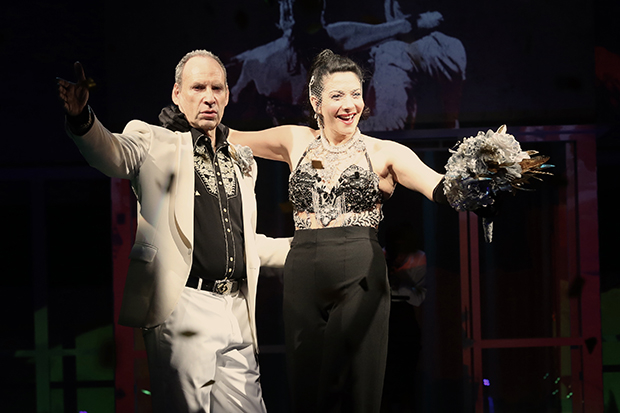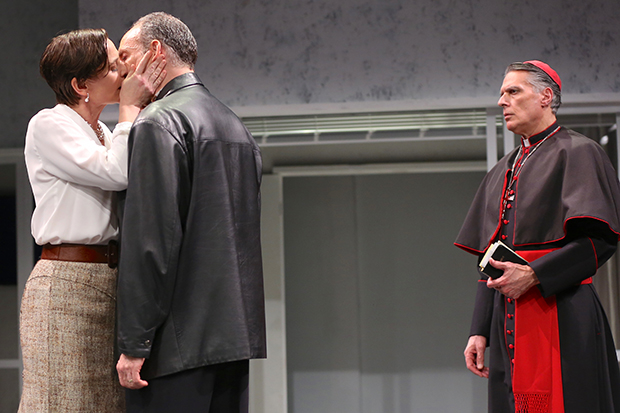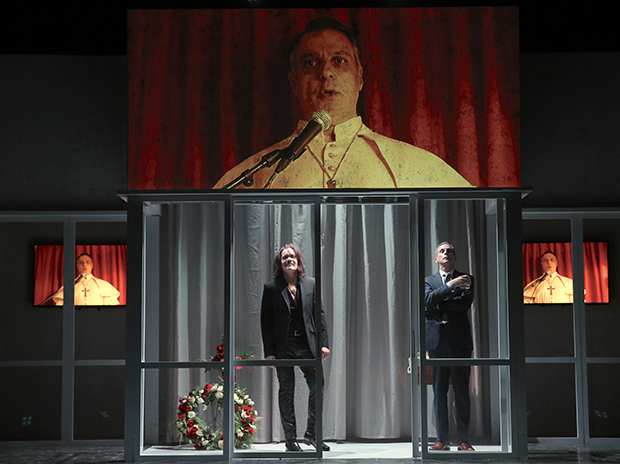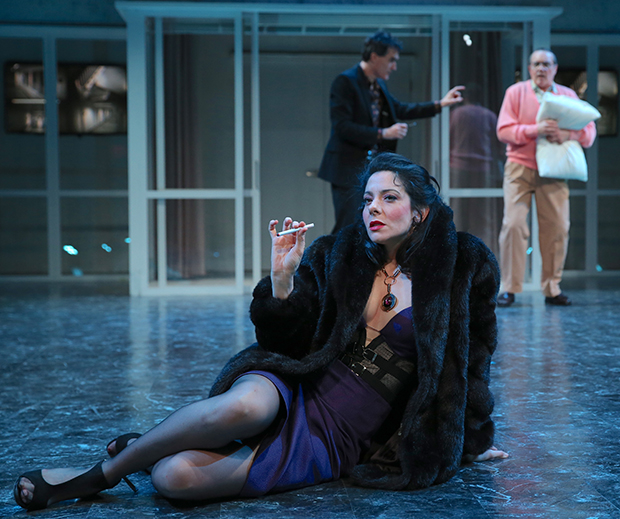A Midlife Crisis Leads to Murder in The White Devil
John Webster’s 1612 revenge tragedy gets an off-Broadway revival.

(© Carol Rosegg)
Rich people can afford to do terrible things when they're in love. That is perhaps the only useful takeaway from John Webster's The White Devil, now getting an undeniably entertaining but insufficiently outrageous revival from Red Bull Theater at the Lucille Lortel Theatre.
The original Red Bull Theatre in London was the site of the play's uncelebrated 1612 world premiere, so the venue's American namesake feels like the right troupe to lavish this Jacobean revenge tragedy with the kind of love it never received in its childhood. That love is evident in Louisa Proske's well-conceived modern-dress production. There are glimmers of the high camp and cheap thrills this script is capable of producing, but not enough. The White Devil is the 17th-century equivalent of a B movie. It's a postcard from a decadent society that, in retrospect, should have seen that puritan dictatorship coming.

(© Carol Rosegg)
Webster sets his play in Italy, a land few of his viewers would have visited, but on which they would have been able to project their anxieties about living in a violent kakistocracy (perhaps in a manner similar to the way contemporary Americans view Russia). The Duke of Brachiano (Daniel Oreskes) is in love with Venetian noblewoman Vittoria Corombona (Lisa Birnbaum), but she is married to Camillo (a nebbishy Derek Smith). Also, Brachiano is married to Isabella de Medici (Jenny Bacon) — yes, those Medicis. After Brachiano and his secretary Flamineo (Tommy Schrider as an ambitious personal assistant) conspire to murder Camillo and Isabella, her brother Francisco (T. Ryder Smith as a somewhat stiff Duke of Florence) plots revenge.
More characters add to the intrigue, like Camillo's uncle, Cardinal Monticelso (an imperious Robert Cuccioli), and Vittoria's servant Zanche (Cherie Corinne Rice, straight out of a Bond film). As Vittoria's mother, Cornelia, Socorro Santiago gives a sympathetic performance as the only redeemable character in this play — so naturally, she goes insane and starts handing out flowers in a scene uncannily reminiscent of Ophelia's mad scene in Hamlet. Webster knew how to write a baddie, but unlike Shakespeare, he leaves us no one to root for.

(© Carol Rosegg)
Birnbaum and Oreskes both deliver passionate and grotesque performances as the unlovable lovers at the heart of this tale. Of the cast, Derek Smith (as both Camillo and the debauched Count Lodovico) comes the closest to the kind of heightened portrayal this script calls for, seeming to derive sexual pleasure from revolting acts of violence.
Proske's staging deploys multiple blood packets, but it still feels sparing. The fight direction by Rick and Christian Kelly-Sordelet is sufficient, but not as jaw-droppingly inventive as it could be. Kate Noll has made good use of the thrust stage (an exciting modification of the Lortel), while her upstage structure of glass panels and mini-blinds establishes the contemporary setting from the moment we enter. Jiyoun Chang's multicolored LED lights lend an element of trash to the proceedings, as do Chad Raines's melodramatic sound cues. Yana Birÿkova's video design is super cheesy, often inducing laughs with its cheap horror-film aesthetic. It made me wonder if The White Devil might work better as a movie.

(© Carol Rosegg)
Of all the design elements, Beth Goldenberg's smartly selected costumes offer the most insight into the story: Vittoria's strappy low-cut dress makes her look like a reality TV housewife that moonlights as a dominatrix, while Brachiano's flamboyant shirt and leather jacket scream "midlife crisis." Only one costume directly references contemporary politics: Cuccioli hilariously plays a physician that is a carbon copy of Trump doctor Harold Bornstein), but we're easily able to recognize all of these awful people as members of the ruling class.
A feminist reading of The White Devil would highlight the plight of Vittoria, who is sent to a "house of penitent whores" for her crimes, while her brother and lover escape scot-free (for a time). Webster effectively captures the way women are held to a higher standard than men, but he also shows how it is possible for Vittoria to hide her very bad behavior behind the unequal treatment of her sex. The cry of "misogyny" by powerful and unscrupulous women certainly helps explain the toxic male backlash in our own time, and it might have had something to do with the decay of English society in the half-century following the reign of Elizabeth.








